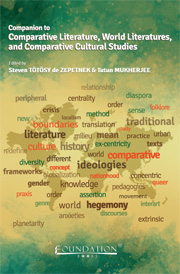Book contents
- Frontmatter
- Contents
- Introduction to the Companion to Comparative Literature, World Literatures, and Comparative Cultural Studies
- PART 1 Theories of Comparative Literature, World Literatures, and Comparative Cultural Studies
- The Contextual Study of Literature and Culture, Globalization, and Digital Humanities
- Comparative Literature and Ex-centricity
- Possibilities and Limits of Comparative Literature Today
- Comparative Cultural Studies and Pedagogy
- Teaching World Literatures
- Comparative Literature and the History of Literature
- Meltzl de Lomnitz, Comparative Literature, and Philosophy
- Comparative Cultural Studies and Cultural Anthropology
- Comparative Literature and Interart Studies
- Gender and Genre in Comparative Literature and (Comparative) Cultural Studies
- Comparative Cultural Studies and Translation Studies
- Comparative Cultural Studies and the Study of Medieval Literature
- Comparative Cultural Studies and Linguistic Hybridities in Literature
- Comparison and Postcoloniality
- (Inter)mediality and the Study of Literature
- PART 2 Comparative Literature in World Languages
- PART 3 Examples of New Work in Comparative Literature, World Literatures, and Comparative Cultural Studies
- PART 4 Multilingual Bibliography of Books in Comparative Literature, World Literatures, and Comparative Cultural Studies
- Index
Comparative Cultural Studies and Linguistic Hybridities in Literature
from PART 1 - Theories of Comparative Literature, World Literatures, and Comparative Cultural Studies
Published online by Cambridge University Press: 05 April 2014
- Frontmatter
- Contents
- Introduction to the Companion to Comparative Literature, World Literatures, and Comparative Cultural Studies
- PART 1 Theories of Comparative Literature, World Literatures, and Comparative Cultural Studies
- The Contextual Study of Literature and Culture, Globalization, and Digital Humanities
- Comparative Literature and Ex-centricity
- Possibilities and Limits of Comparative Literature Today
- Comparative Cultural Studies and Pedagogy
- Teaching World Literatures
- Comparative Literature and the History of Literature
- Meltzl de Lomnitz, Comparative Literature, and Philosophy
- Comparative Cultural Studies and Cultural Anthropology
- Comparative Literature and Interart Studies
- Gender and Genre in Comparative Literature and (Comparative) Cultural Studies
- Comparative Cultural Studies and Translation Studies
- Comparative Cultural Studies and the Study of Medieval Literature
- Comparative Cultural Studies and Linguistic Hybridities in Literature
- Comparison and Postcoloniality
- (Inter)mediality and the Study of Literature
- PART 2 Comparative Literature in World Languages
- PART 3 Examples of New Work in Comparative Literature, World Literatures, and Comparative Cultural Studies
- PART 4 Multilingual Bibliography of Books in Comparative Literature, World Literatures, and Comparative Cultural Studies
- Index
Summary
Abstract: In her article “Comparative Cultural Studies and Linguistic Hybridities in Literature.” Sturm-Trigonakis takes her point of departure with Goethe's notion of Weltliteratur and proposes that owing to globalization, literature is undergoing a change in process, content, and linguistic practice. The framework Sturm-Trigonakis constructs is based on comparative cultural studies and its methodology of the contextual (systemic and empirical) approach to the study of literature and culture and the concepts of the macro- and micro-system. In order to exemplify her proposition, Sturm-Trigonakis discusses selected literary texts which show characteristics of linguistic hybridity, the concept of “in-between,” and transculturality, thus located in new Weltliteratur.
Introduction
In 1827 Goethe inaugurated the age of Weltliteratur with his observation that national literature has lost importance and must now be substituted by world literature (Goethe qtd. in Eckermann, Gespräche 174). Goethe's ambiguous inheritance has provoked a plethora of interpretations since then (with regard to current work on this, see, e.g., Birus; Koch; Lamping; Pizer; Prendergast; Schmeling). Two aspects of Goethe's notion, namely world literature as a process of communication and exchange between various national literatures and the anchorage of world literatures in the economic and technical context of Europe at the outset of the nineteenth century offer a common denominator with the contemporary age of globalization.
- Type
- Chapter
- Information
- Companion to Comparative Literature, World Literatures, and Comparative Cultural Studies , pp. 178 - 191Publisher: Foundation BooksPrint publication year: 2014

